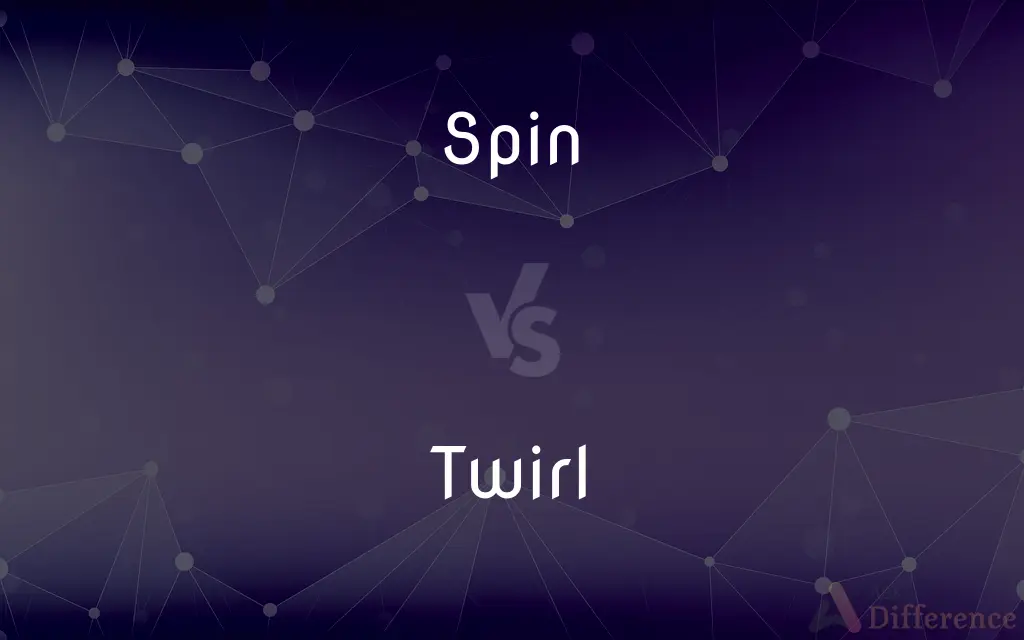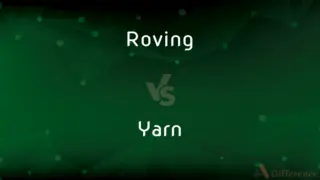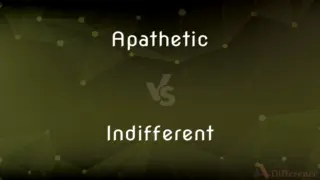Spin vs. Twirl — What's the Difference?
By Tayyaba Rehman & Fiza Rafique — Updated on April 9, 2024
Spin involves rapid rotation around an axis, while twirl usually denotes a lighter, more graceful revolving motion.

Difference Between Spin and Twirl
Table of Contents
ADVERTISEMENT
Key Differences
Spin is a term that describes a rapid, often forceful rotation around a central axis. This action can apply to objects, from spinning tops to planets in orbit, emphasizing the speed and continuous nature of the movement. In contrast, twirl often carries a lighter, more delicate connotation, frequently associated with dance or the playful movement of objects like batons. It implies a certain grace and control, focusing more on the aesthetic of the motion than on its speed or force.
When something spins, the emphasis is on the speed and efficiency of the movement, often driven by an external force or inherent momentum. For example, a wheel spins rapidly on its axle, and a dancer might spin quickly in a pirouette, focusing on precision and speed. On the other hand, when someone twirls an object or themselves, it suggests a controlled, often slower rotation that is as much about display and form as it is about the rotation itself, such as twirling a ribbon or performing a slower, more controlled dance move.
The physical contexts in which "spin" and "twirl" are used also differ. "Spin" is often used in scientific, mechanical, or sports-related contexts, where precision, speed, and the physical forces involved are of primary concern. Conversely, "twirl" is more commonly found in artistic or casual contexts, where the visual effect and grace of the movement are more significant than the technical aspects of the motion.
Despite these differences, there's an overlap in some contexts where either term could be applicable, depending on the emphasis. A figure skater, for instance, could be said to spin or twirl during a performance, with "spin" highlighting the athleticism and speed of the movement, and "twirl" emphasizing its elegance and control.
The choice between "spin" and "twirl" often depends on the context and the aspects of the motion one wishes to highlight: the force and speed of spinning versus the grace and aesthetics of twirling.
ADVERTISEMENT
Comparison Chart
Definition
Rapid rotation around a central axis.
Graceful, controlled rotation around an axis.
Connotation
Emphasizes speed and force.
Suggests grace, elegance, and control.
Common Contexts
Scientific, mechanical, sports.
Artistic, dance, casual play.
Focus
Precision, speed, physical forces.
Aesthetics, form, visual effect.
Examples
Spinning a top, a planet's orbit, a dancer's pirouette.
Twirling a baton, ribbon dancing, a slow dance spin.
Compare with Definitions
Spin
A fast rotation around an axis.
The figure skater executed a flawless spin on the ice.
Twirl
Combines control with aesthetic display.
The majorette twirled her baton at the parade.
Spin
Emphasizes dynamic motion and energy.
The dancer’s spin left the audience in awe.
Twirl
Suggests lightness and playfulness.
With a smile, he twirled his partner around the dance floor.
Spin
Movement driven by external force or momentum.
The mechanic observed the tire spin rapidly.
Twirl
Can denote a casual, spontaneous action.
She idly twirled a pencil between her fingers.
Spin
Can apply to objects and people alike.
The child loved watching the toy spin on the floor.
Twirl
A graceful revolving motion.
She twirled the umbrella as she danced in the rain.
Spin
Often used in precise, technical contexts.
The planet spins on its axis once every 24 hours.
Twirl
Frequently associated with dance and performance.
The ballerina's twirl was the highlight of the performance.
Spin
To rotate rapidly; whirl.
Twirl
To rotate or revolve briskly; swing in a circle; spin
Twirled a baton to lead the band.
Spin
To have a sensation of whirling, as from dizziness; reel
My head spun after I did a cartwheel.
Twirl
To twist or wind around
Twirl thread on a spindle.
Spin
To make thread or yarn by drawing out and twisting fibers.
Twirl
To move or spin around rapidly, suddenly, or repeatedly
The pinwheel twirled in the breeze.
Spin
To extrude viscous filaments, forming a web or cocoon.
Twirl
To whirl or turn suddenly; make an about-face
Twirled in the direction of the noise.
Spin
To fish with a light rod, lure, and line and a reel with a stationary spool.
Twirl
(Baseball) To pitch.
Spin
To cause to rotate swiftly; twirl
Spin a top.
Twirl
The act of twirling or the condition of being twirled; a quick spinning or twisting.
Spin
To shape or manufacture by a twirling or rotating process.
Twirl
Something twirled; a twist
A twirl of cotton candy.
Spin
(Informal) To play (a recorded piece of music, such as a phonograph record), especially as a disc jockey.
Twirl
A movement where a person spins round elegantly; a pirouette.
Spin
To provide an interpretation of (a statement or event, for example), especially in a way meant to sway public opinion
"a messenger who spins bogus research into a vile theology of hatred" (William A. Henry III).
Twirl
Any rotating movement; a spin.
The conductor gave his baton a twirl, and the orchestra began to play.
Spin
To draw out and twist (fibers) into thread.
Twirl
A little twist of some substance; a swirl.
Spin
To form (thread or yarn) in this manner.
Twirl
(slang) A prison guard.
Spin
To form (a web or cocoon, for example) by extruding viscous filaments.
Twirl
(intransitive) To perform a twirl.
Spin
To relate or create
Spin a story.
Twirl
(transitive) To rotate rapidly.
Spin
The act of spinning.
Twirl
(transitive) To twist round.
Spin
A swift whirling motion.
Twirl
(baseball) To pitch.
Spin
A state of mental confusion
I've been in a spin about this all week.
Twirl
To move or turn round rapidly; to whirl round; to move and turn rapidly with the fingers.
See ruddy maids,Some taught with dexterous hand to twirl the wheel.
No more beneath soft eve's consenting starFandango twirls his jocund castanet.
Spin
(Informal) A short drive in a vehicle
Took a spin in the new car.
Twirl
To revolve with velocity; to be whirled round rapidly.
Spin
The flight condition of an aircraft in a nose-down, spiraling, stalled descent.
Twirl
The act of twirling; a rapid circular motion; a whirl or whirling; quick rotation.
Spin
A distinctive point of view, emphasis, or interpretation
"adept at putting spin on an apparently neutral recital of facts" (Robert M. Adams).
Twirl
A twist; a convolution.
Spin
A distinctive character or style
An innovative chef who puts a new spin on traditional fare.
Twirl
A sharp bend in a line produced when a line having a loop is pulled tight
Spin
The angular momentum of rotation of a rigid body about its own axis.
Twirl
The act of rotating rapidly;
He gave the crank a spin
It broke off after much twisting
Spin
The intrinsic angular momentum of a subatomic particle. Also called spin angular momentum.
Twirl
Turn in a twisting or spinning motion;
The leaves swirled in the autumn wind
Spin
(ergative) To rotate, revolve, gyrate (usually quickly); to partially or completely rotate to face another direction.
I spun myself around a few times.
Spin the ball on the floor.
She spun around and gave him a big smile.
Twirl
Cause to spin;
Spin a coin
Spin
To enter, or remain in, a spin (abnormal stalled flight mode).
Spin
To cause one's aircraft to enter or remain in a spin (abnormal stalled flight mode).
Spin
(transitive) To make yarn by twisting and winding fibers together.
They spin the cotton into thread.
Spin
(figurative) To present, describe, or interpret, or to introduce a bias or slant, so as to give something a favorable or advantageous appearance.
Spin
To make the ball move sideways when it bounces on the pitch.
Spin
To move sideways when bouncing.
Spin
(cooking) To form into thin strips or ribbons, as with sugar
Spin
To form (a web, a cocoon, silk, etc.) from threads produced by the extrusion of a viscid, transparent liquid, which hardens on coming into contact with the air; said of the spider, the silkworm, etc.
Spin
To shape, as malleable sheet metal, into a hollow form, by bending or buckling it by pressing against it with a smooth hand tool or roller while the metal revolves, as in a lathe.
Spin
To move swiftly.
To spin along the road in a carriage, on a bicycle, etc.
Spin
To stream or issue in a thread or a small current or jet.
Blood spins from a vein.
Spin
To wait in a loop until some condition becomes true.
Spin
To play (vinyl records, etc.) as a disc jockey.
Spin
To use an exercise bicycle, especially as part of a gym class.
Spin
To ride a bicycle at a fast cadence.
Spin
To search rapidly.
Spin
Rapid circular motion.
The car went into a spin.
The skaters demonstrated their spins.
He put some spin on the cue ball.
Spin
(physics) A quantum angular momentum associated with subatomic particles, which also creates a magnetic moment.
Spin
A favourable comment or interpretation intended to bias opinion on an otherwise unpleasant situation.
Try to put a positive spin on the disappointing sales figures.
The politician was mocked in the press for his reliance on spin rather than facts.
Spin
(sports) Rotation of the ball as it flies through the air; sideways movement of the ball as it bounces.
Spin
(aviation) A condition of flight where a stalled aircraft is simultaneously pitching, yawing and rolling in a spinning motion.
Spin
(mechanical engineering) An abnormal condition in journal bearings where the bearing seizes to the rotating shaft and rotates inside the journal, destroying both the shaft and the journal.
Spin
A brief trip by vehicle, especially one made for pleasure.
I'm off out for a spin in my new sports car.
Spin
A bundle of spun material; a mass of strands and filaments.
Spin
A single play of a record by a radio station.
Spin
A search of a prisoner's cell for forbidden articles.
Spin
(dated) An unmarried woman; a spinster.
Spin
(uncountable) The use of an exercise bicycle, especially as part of a gym class.
Spin
Special interest of an autistic person.
Spin
To draw out, and twist into threads, either by the hand or machinery; as, to spin wool, cotton, or flax; to spin goat's hair; to produce by drawing out and twisting a fibrous material.
All the yarn she [Penelope] spun in Ulysses' absence did but fill Ithaca full of moths.
Spin
To draw out tediously; to form by a slow process, or by degrees; to extend to a great length; - with out; as, to spin out large volumes on a subject.
Do you mean that story is tediously spun out?
Spin
To protract; to spend by delays; as, to spin out the day in idleness.
By one delay after another they spin out their whole lives.
Spin
To cause to turn round rapidly; to whirl; to twirl; as, to spin a top.
Spin
To form (a web, a cocoon, silk, or the like) from threads produced by the extrusion of a viscid, transparent liquid, which hardens on coming into contact with the air; - said of the spider, the silkworm, etc.
Spin
To shape, as malleable sheet metal, into a hollow form, by bending or buckling it by pressing against it with a smooth hand tool or roller while the metal revolves, as in a lathe.
Spin
To practice spinning; to work at drawing and twisting threads; to make yarn or thread from fiber; as, the woman knows how to spin; a machine or jenny spins with great exactness.
They neither know to spin, nor care to toll.
Spin
To move round rapidly; to whirl; to revolve, as a top or a spindle, about its axis.
Round about him spun the landscape,Sky and forest reeled together.
With a whirligig of jubilant mosquitoes spinning about each head.
Spin
To stream or issue in a thread or a small current or jet; as, blood spinsfrom a vein.
Spin
To move swifty; as, to spin along the road in a carriage, on a bicycle, etc.
Spin
The act of spinning; as, the spin of a top; a spin a bicycle.
Spin
Velocity of rotation about some specified axis.
Spin
An interpretation of an event which is favorable to the interpreter or to the person s/he supports. A person whose task is to provide such interpretations for public relations purposes is called a spin doctor.
Spin
A swift whirling motion (usually of a missile)
Spin
The act of rotating rapidly;
He gave the crank a spin
It broke off after much twisting
Spin
A short drive in a car;
He took the new car for a spin
Spin
Rapid descent of an aircraft in a steep spiral
Spin
A distinctive interpretation (especially as used by politicians to sway public opinion);
The campaign put a favorable spin on the story
Spin
Revolve quickly and repeatedly around one's own axis;
The dervishes whirl around and around without getting dizzy
Spin
Stream in jets, of liquids;
The creek spun its course through the woods
Spin
Cause to spin;
Spin a coin
Spin
Make up a story;
Spin a yarn
Spin
Form a web by making a thread;
Spiders spin a fine web
Spin
Work natural fibers into a thread;
Spin silk
Spin
Twist and turn so as to give an intended interpretation;
The President's spokesmen had to spin the story to make it less embarrasing
Spin
Prolong or extend;
Spin out a visit
Common Curiosities
Are there activities where both spinning and twirling are important?
In many forms of dance and performance arts, both actions are integral for their distinct effects and appeals.
Can "spin" and "twirl" be used interchangeably?
While they have similar meanings, the choice depends on the context and the nuance one wishes to convey: the speed and energy of spinning versus the grace of twirling.
Can objects other than people twirl?
Yes, objects like batons, ribbons, and leaves can be described as twirling, especially when moved in a graceful or playful manner.
Is twirling always slower than spinning?
Not necessarily slower, but twirling emphasizes grace and control over sheer speed.
Do spin and twirl have different emotional connotations?
"Spin" can evoke excitement and intensity, while "twirl" often suggests joy and elegance.
How do culture and context influence the use of spin vs. twirl?
Cultural contexts and the specific traditions of different activities can dictate whether an action is more commonly described as a spin or a twirl.
How do spin and twirl relate to physical forces?
"Spin" often involves discussions of physical forces like momentum and friction, while "twirl" focuses more on the control and intent behind the motion.
Can the same action be described as both a spin and a twirl?
Yes, depending on the perspective and what aspect of the action one wishes to emphasize: the technical execution (spin) or the aesthetic quality (twirl).
Is spinning more common in certain fields than twirling?
Yes, "spin" is more common in scientific, mechanical, and sports contexts, while "twirl" is more associated with artistic and casual settings.
Can the choice between spin and twirl affect the perception of a performance?
Absolutely, using "twirl" might highlight the gracefulness of a movement, while "spin" could emphasize its dynamic power.
Share Your Discovery

Previous Comparison
Roving vs. Yarn
Next Comparison
Apathetic vs. IndifferentAuthor Spotlight
Written by
Tayyaba RehmanTayyaba Rehman is a distinguished writer, currently serving as a primary contributor to askdifference.com. As a researcher in semantics and etymology, Tayyaba's passion for the complexity of languages and their distinctions has found a perfect home on the platform. Tayyaba delves into the intricacies of language, distinguishing between commonly confused words and phrases, thereby providing clarity for readers worldwide.
Co-written by
Fiza RafiqueFiza Rafique is a skilled content writer at AskDifference.com, where she meticulously refines and enhances written pieces. Drawing from her vast editorial expertise, Fiza ensures clarity, accuracy, and precision in every article. Passionate about language, she continually seeks to elevate the quality of content for readers worldwide.
















































